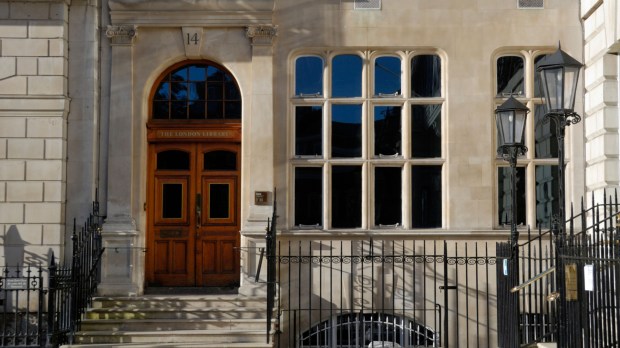Not long after the murder of Drummer Lee Rigby in Woolwich last summer, I wrote a piece in the Daily Telegraph criticising the concentration on the alleged backlash against Muslims. In particular, I attacked an organisation called Tell Mamma, run by Fiyaz Mughal, for appearing to suggest that the unpleasant EDL was as monstrous as al-Qa’eda. Later in the piece, I wrote that, when you publish on such matters, you are all too often ‘subject to “lawfare” — a blizzard of solicitors’ letters claiming damages for usually imagined libels’. So it proved. Along came a solicitor’s letter from the firm of Farooq Bajwa, saying that I had described Mr Mughal as an extremist. Last week, I attended a court hearing. Was the complainant right about the ‘natural and ordinary meaning’ of my words? This week the judge, Mr Justice Tugendhat, determined that he was wrong, so we won. Mr Mughal, who is, indeed, not an extremist but seems to be a fool, has now lost two legal cases (including mine) and a PCC case on related matters. What is depressing is the habit among some Muslim groups of seeing ordinary unfavourable comment as something to suppress through the law. Why can’t they debate, not litigate?
The pop star Brian May complains about his rich, ‘selfish’ neighbours doing endless building work all round him in Kensington. What do good West Country people think of their rich neighbour Brian May on his land down there as he tries to prevent badger culls which would save their cattle from TB?
One of the best things that happened to me when young was that I came to know the great philosopher Michael Oakeshott. His philosophical approach was manifest in his life in the most delightful way. The idea of ‘conversation’ is central to his thought, famously expressed in his essay ‘The Voice of Poetry in the Conversation of Mankind’. The word can be used in a rather arch, genteel, Lord Chesterfield sort of way, but that is not what Michael meant. He was interested in conversation because of its lack of exterior purpose or ambition, its interaction of human sympathy and human independence, its potential for joy and surprise. This was part of his wider thought. He wrestled constantly with the overwhelming fact of mortality and the accompanying perception that human life is ‘neither long, nor short’, rightly lived neither for the fleeting minute nor for some unreachable future. Michael’s own conversation unselfconsciously accorded with his beliefs — its unexpectedness, charm, egalitarianism, amusement, interest in others, disinclination to talk for victory or to achieve a specific result, its air of having all the time in the world. He must have been 75 when I first met him, and I 18, but he made nothing of this difference except to express his envy. Everything he said was wise because, to use an Oakeshottian paradox, he never tried to be. So it is a thrill to read his recently published Notebooks 1922–86, edited by Luke O’Sullivan (Imprint Academic). The best thing is to quote them. I can hear Michael talking.
Here are some examples:
‘Anyone who has been touched at all deeply by the instinct for life must love “fashion” & find a peculiar fascination in it.’
‘a new dark age of enlightenment’
‘Revolutions design to demolish cathedrals, but like earthquakes, they are apt also to fracture the main drain.’
‘At parting, it is the one who is not in love who makes tender speeches.’
‘You need to be well-mounted for leaping the hedge of custom.’
‘If I went with a prostitute, I should want to bring her flowers.’
‘The bourgeois holds the world together for the poet.’
‘Nelson was sea-sick from the first time to the last time he was afloat. What would a vocational director make of that?’
‘Culture implies cultivation; it’s not to be acquired in a seed shop.’
‘In pretty girls moral qualities are not so awfully relevant.’
‘God died, not in battle or in peace with his dogs around him, but by treachery.’
‘Everything is penultimate.’
Oakeshott’s attitude to politics was both wary and interested. He was famously against ‘Rationalism in Politics’. In his Notebooks, he writes, ‘Progress leads to planning. Civilisation is humbler…’. ‘Politics is a suitable subject for conversation; perhaps that is all it is suitable for.’ He prefers democracy because it is ‘politics become conversible’. He is the constant critic of power, without being an advocate of anarchy. Serving in the war, he hated applying it to peace: ‘The politics of peace conceived in the categories of war… — “labour front” — “D-Day in the schools” — “five year plan” …is a false politics: Germany, Russia.’ He preferred the more modest achievements of mankind: ‘Great ages, like great men, are apt to be hard; they are out of touch with mortality.’
I was excited to find Oakeshott express a thought long at the back of my mind: ‘an intelligent countryman can quickly grasp the life of the town, its complexity. No townsman can ever fill the gap caused by the failure to live in the country and grow up in it.’
On religion (by which he chiefly means Christianity), Oakeshott is subtle. He is religious, but avoids truth claims. He deprecates the doctrine of a future life, not as being impossible, but because it distracts people from the unique importance of the life they have. Yet he also says that ‘A true religion is the integration in each individual of his attitude to death.’ Last week, in our village churchyard, we buried my beloved mother-in-law (nice, and rare, to be able to use that adjective with that noun), Ann Baxter. ‘The Lord gave, and the Lord hath taken away; blessed be the name of the Lord’, said one of the Sentences from the English book in which that integration most fully takes place.
Got something to add? Join the discussion and comment below.
Get 10 issues for just $10
Subscribe to The Spectator Australia today for the next 10 magazine issues, plus full online access, for just $10.
You might disagree with half of it, but you’ll enjoy reading all of it. Try your first month for free, then just $2 a week for the remainder of your first year.















Comments
Don't miss out
Join the conversation with other Spectator Australia readers. Subscribe to leave a comment.
SUBSCRIBEAlready a subscriber? Log in